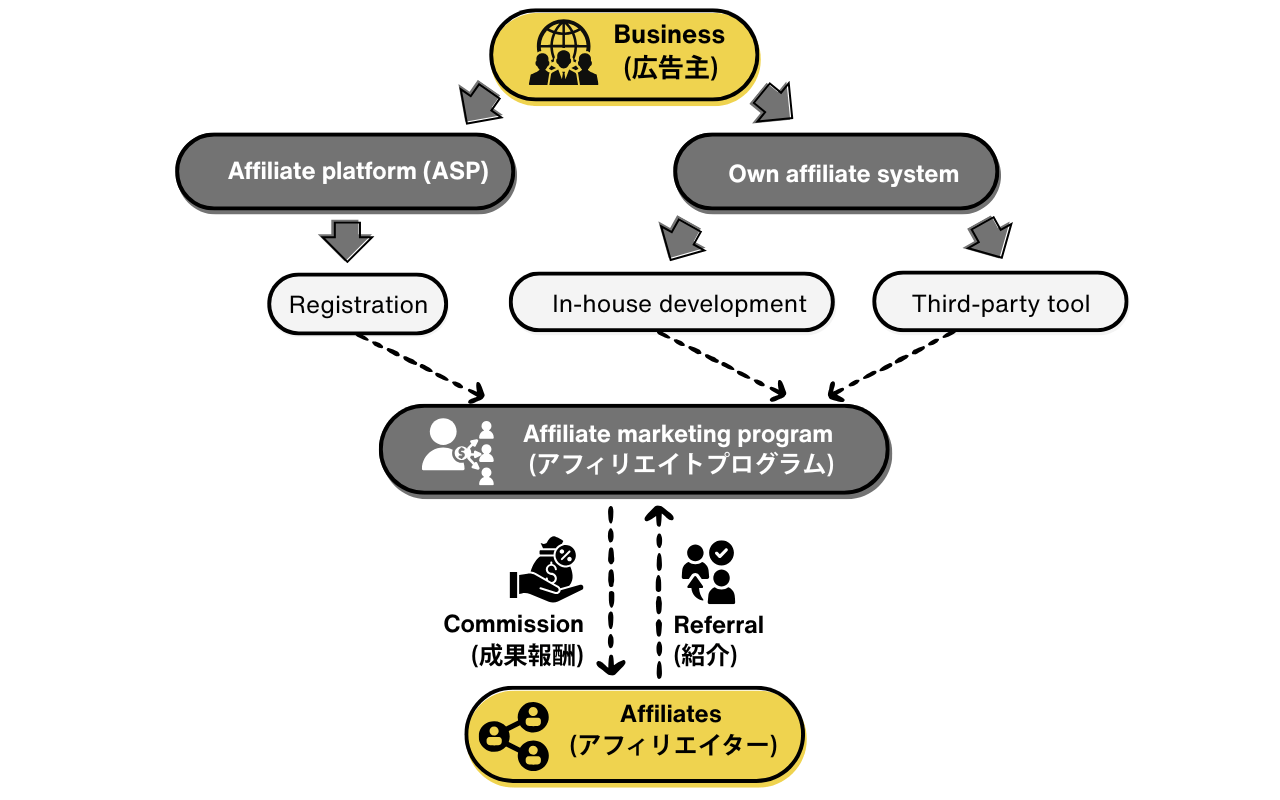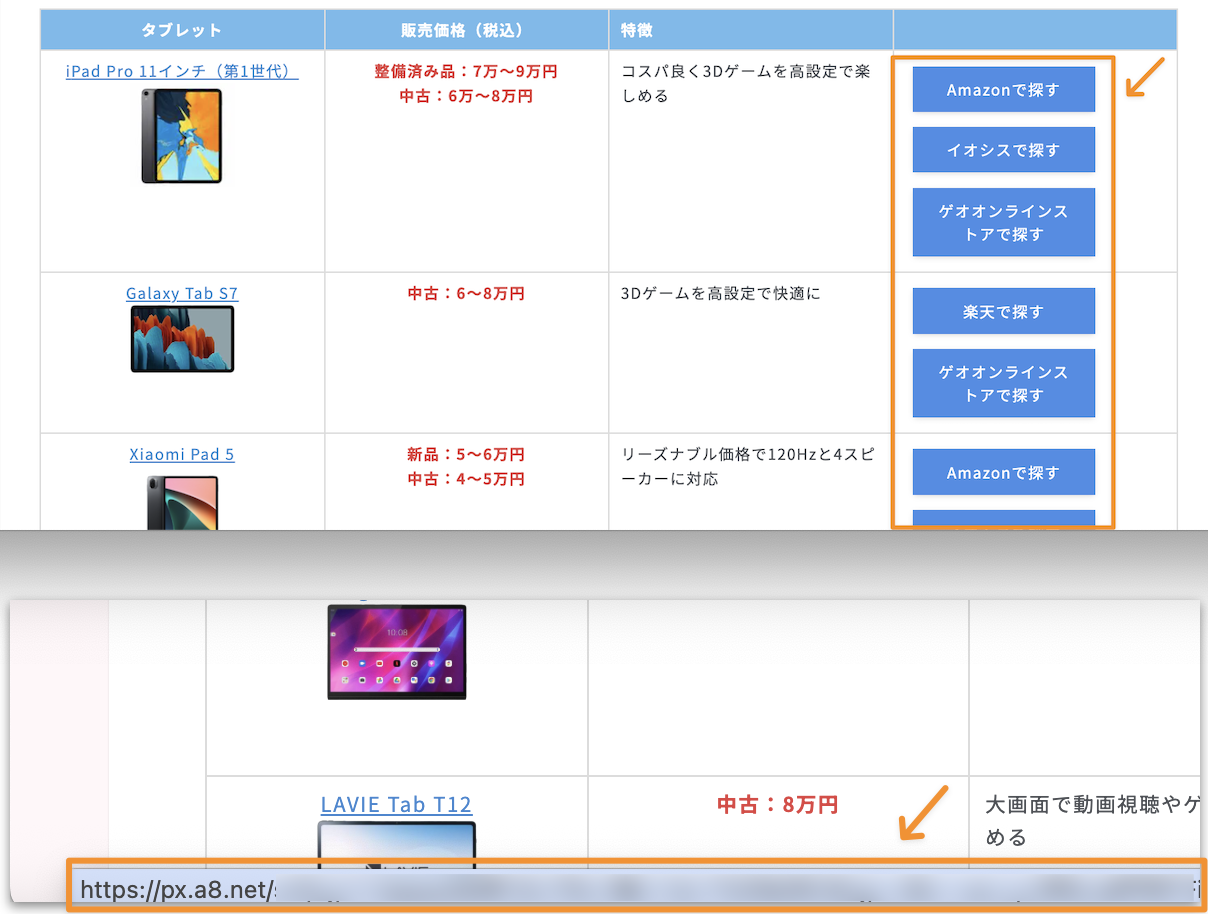Affiliate marketing is a big deal in Japan. It allows businesses to expand their reach exponentially, and even individuals with minimal influence can start earning money. With the right approach, both sides can run their efforts in an automated way. Whether you’re looking to grow your business in Japan or explore a new income stream, affiliate marketing is definitely worth considering.
Introduction to affiliate marketing in Japan
In recent years, affiliate marketing in Japan has seen tremendous growth, attracting both local and international companies.
Definition of affiliate marketing
Affiliate marketing is a form of marketing. In other words, it’s a way to spread the word about a product or service. For simplicity, let’s just refer to what’s being sold as “the product.” A company creates and sells a product, but to get more attention for it, they need people to know it exists. That’s where affiliate marketing comes in. It allows businesses to promote their products with minimal effort by partnering with others who do the promotion for them.
This system is called affiliate marketing. Anyone who joins the program to promote the product is called an affiliate. Affiliates use their own channels, such as websites or social media accounts, to share and promote the product. Whenever someone buys the product through their referral, the affiliate earns a reward. This is called a commission.
That’s the basic idea of how affiliate marketing works, whether in Japan or elsewhere. But to go a bit deeper, here are some of the key players and terms you’ll often see:

- Businesses (also called merchants, vendors, or advertisers): These are the companies that want to sell their products beyond their own organic reach. They rely on the networks of affiliates to help spread the word and drive sales. In Japanese, they are called “広告主 (publisher)”.
- Affiliates: Affiliates are individuals or companies who join affiliate programs and promote products. In return, they receive commissions when someone makes a purchase through their referral. In Japaense, they are called “アフィリエイター (affiliater)”.
- Affiliate marketing program: This refers to the actual system or structure set up by a business to manage affiliate activity. Some companies build and manage their own programs, while others use third-party affiliate networks to handle tracking, payouts, and reporting. In Japapanese, normally removing “marketing”, we call it “アフィリエイトプログラム (affiiate program)”.
- Affiliate marketing network (platform): As mentioned above, affiliate marketing networks (also called platforms) handle the foundations of affiliate marketing programs. Advertisers register and create their own programs, while affiliates sign up to start referring potential customers. In Japanese, it’s called ASP, which is confusingly different from the English term. ASP stands for Affiliate Service Provider.
- Commission: A commission is the reward paid to an affiliate when their referral results in a successful sale. It can be a fixed amount or a percentage of the sale, depending on the program. In Japan, it’s referred to as “成果報酬” or “コミッション” (both mean “commission”).
These are the basics, but there’s more to know if you want to succeed with affiliate marketing in Japan. I’ll walk you through the details in the rest of this article, so stick around.
Affiliate marketing importance in Japan
I can’t stress enough how important affiliate marketing in Japan is. Over the years, I’ve helped countless international businesses enter the Japanese market, and affiliate marketing has consistently played a key role in the overall strategy.
In fact, affiliate marketing is a huge part of the digital landscape in Japan. It’s not unusual to find several blog articles competing for the same search terms, all written by different affiliates hoping to earn commissions. Personally, I often come across a string of affiliate blogs (dominating the SERPs) when researching a topic, and just by reading through their detailed content, I get a solid understanding of the subject.
This tells us something important: there’s a large number of bloggers actively looking for new products to promote. Many of them are hungry to increase their income and eager to differentiate themselves in a saturated space.
Here’s one example of a Japanese blog that uses affiliate marketing. By the way, A8.net is one of the leading ASPs (Do you remember? It means “affiliate marketing network”) in Japan.

When it comes to affiliate marketing through blogging, the barrier to entry is pretty low. These days, all you need is a basic level of web literacy and internet access. You can set up a site quickly and start running your affiliate activities right away.
This combination of flexibility and potential for passive income has made affiliate blogging especially appealing. It’s become a popular path for those seeking the freedom to work from home, on their own schedule.
Growth trends of affiliate marketing in Japan
The affiliate marketing in Japan continues to grow, driven by greater internet accessibility and the fact that more people, especially younger generations, feel comfortable creating and sharing their own content online. This shift is largely influenced by their familiarity with user-generated content, like what we see on social media every day.
For many, especially those in their teens and twenties, publishing content doesn’t feel intimidating anymore. On the contrary, it feels natural. They’re used to expressing themselves online, so setting up a blog or promoting a product on Instagram feels like a logical next step. This cultural shift is accelerating the growth of affiliate marketing even further.
Opportunities in affiliate marketing in Japan
Next, I’ll showcase the lucrative and attractive nature of Japanese affiliate marketing.
For bussiness – niche markets in Japan
Affiliate marketing in Japan is a can’t-miss opportunity for many businesses. As I mentioned earlier, Japan is full of passionate bloggers who are constantly on the lookout for new ways to monetize their websites and diversify their income. This creates a strong foundation for any business looking to expand into the Japanese market.
I’m sure you’re eager to reach more Japanese customers, but let’s be honest, creating thousands of pages of content to drive SEO traffic directly to your site isn’t always realistic (although with our SEO expertise and full managed service, it’s absolutely possible).
If that approach doesn’t suit your current situation, affiliate marketing is a smart alternative. It allows you to reduce both cost and risk while leveraging the wide network of Japanese affiliates who already know how to speak to local audiences. Moreover, when affiliate marketing is combined with other marketing strategies, the results often amplify each other and create a stronger overall impact.
For individuals – passive income streams
For individuals who seek a low-investment and low-commitment income source, affiliate marketing is a practical choice to consider. All you need is a computer (or smartphone if you feel comfortable typing long content on it) and a blog or social media account. The main idea is that you don’t need to manage the product by yourself; you can write about it and show it to the right person who needs the product. Connecting the right product to the right person, and you earn the commission. It’s a pretty elegant system, isn’t it?
The role of Japan influencer marketing
Let me dare to say that affiliate marketing in Japan is a significant part of the economy, especially when transactions take place online. Businesses seek a channel to expand their reach so they can tap into an attractive and often niche-segmented market. Affiliate marketing is a bridge that connects ambitious businesses and growing, agile, and motivated bloggers.
Word of mouth is undoubtedly an effective persuasion method, and we humans are wired to trust the information from fellow users and those who have actually tried the product. The more positive comments and testimonials you have through affiliate marketing, the more credibility your brand gains.
Challenges facing affiliate marketers in Japan
Now that we understand the benefits and role of affiliate marketing in Japan, let’s take a moment to look at some important cautions. There are plenty of mistakes that can be avoided just by knowing how the system works.
This section is worth reading carefully, especially if you want to avoid the common traps businesses fall into when planning or running affiliate campaigns. Some of these points also tie directly into the next section on strategy, so I recommend reading through both to get the full picture.
Cultural nuances (and its connection with the brand)
The first thing to understand is cultural nuance. The way brand messages are communicated in Japan is quite different from what you might see in Western countries. Japanese brands often rely on subtlety and versatility. Rather than using direct “buy now” or “contact us” style, they focus on crafting messaging (everything from taglines to ads to differentiation points) in a way that creates a specific overall impression. Of course, clear CTAs are still used, but the tone is often more refined and culturally aligned. Many international businesses overlook this and end up missing the mark.
I’m not saying you should copy everything Japanese brands do, but at the very least, understanding these nuances is essential. It’s the gateway to recognizing what might resonate with Japanese audiences and what might feel off. Worse, a single wrong move can create a negative impression and damage your brand entirely.
Why am I talking about branding here? Because it’s directly tied to affiliate marketing.
Your brand is not just what you say it is. It’s how people perceive it. No matter how you define your brand internally, what really matters is the impression each customer forms based on every interaction with your business. Every touchpoint contributes to that perception.
When you enter the Japanese affiliate marketing space, you’re inevitably letting your affiliates help shape that brand image, at least to some extent. That’s not a bad thing, but it does mean you need to keep an eye on how your brand is being represented. The goal isn’t to control every word they publish (because you can’t), but to provide affiliates with the right guidance and materials so they can represent your product in the best possible way.
I’ll go deeper into how to do that effectively in the next section on strategies.
How to choose an affiliate marketing company in Japan
Another big challenge is deciding who to work with, and this comes with a few layers. The first step is to figure out how you want to manage your affiliate marketing program. Generally, there are two options:
- You create and run your own affiliate platform → in-house management
- You work with an affiliate marketing network (called ASP) in Japan → using one of the ASPs
The first option gives you more control. You can manage how affiliates refer customers, how commissions are calculated and paid, how the dashboard looks, and how everything integrates with your other tools and tracking systems. The downside is the time and investment it requires. It’s not easy to build and manage a robust affiliate system from scratch, especially if you’re new to the Japanese market.
However, if you are using WordPress to manage your website, there’s a powerful plugin called AffiliateWP.

It supports translation and gives you the flexibility to easily expand your affiliate marketing efforts into the Japanese market, while maintaining control over the details of your own affiliate marketing program.
The second option is using an affiliate marketing network. In Japan, these networks are often called ASPs (Affiliate Service Providers), and my honest advice is this: if your goal is to reach the Japanese market effectively, using a local ASP is much more effective than using one outside Japan.
While some Western affiliate platforms do offer Japanese support, in my experience, their localization is often half-baked or sometimes completely off. It’s wishful thinking to expect Japanese users to engage with a UI written in confusing or awkward Japanese. That language barrier alone can be a dealbreaker. This is exactly why we’re here: to help you navigate those gaps and connect with Japan’s vast network of affiliates the right way.
That leaves us with two realistic paths:
- Build your own in-house affiliate program
- Partner with a Japanese ASP
Just a heads-up, though: The second option, while easier, comes with its own hurdles. The Japanese affiliate industry is still relatively closed, culturally speaking. For example, one of the largest ASPs in Japan, A8.net, has recently stopped accepting new affiliate signups from overseas. There’s no public timeline on when they’ll reopen applications.
These are the kinds of roadblocks that many businesses face when entering the Japanese market. But with the right strategy and the right support, it’s definitely possible to find the best path forward.
Strategies for success in affiliate marketing Japan
We will now move on to the strategies that you can use to maximize the success rate of entering the Japanese market.
Building trust with Japanese audiences
Whether you are a merchant or an affiliate, the key to success lies in trust.
As a business, to succeed in affiliate marketing in Japan, you need to build trust with affiliates so they feel confident promoting your product. For affiliates, trust is just as important. They care deeply about how trustworthy the businesses they work with are, because it directly affects things like commission approval rates. A low approval rate creates doubt and disloyalty (it’s often easy to track with leading ASPs). Plus, affiliates want to recommend products they truly believe in. They don’t want to deceive their audience.
And from the affiliate’s side, trust with their audience is everything. People are constantly looking for sources they can rely on to make important decisions. They’re also very good at detecting anything suspicious, like overly exaggerated advertising or inaccurate product descriptions.
Also, as I briefly mentioned earlier, subtlety matters. Many Japanese readers are put off by aggressive sales language, which is often seen as a negative or pushy tactic culturally.
With that in mind, I’ll now go deeper into what you, as a business, can do to drive the best possible results through affiliate marketing in Japan.
Provide clear affiliate guidance
Let’s now talk about clear guidance. It’s crucial to maintain your brand image so that affiliates don’t spread misinformation or create a negative perception of your business. To ensure your future affiliates represent you well, here are the key things you should prepare:
- Localized affiliate program: It’s important to localize your affiliate program. This can be done by joining a local ASP (Japanese affiliate marketing network) or by translating and adapting your own program for the Japanese market.
- Product localization: Needless to say, product localization is essential. If your product isn’t available in Japanese, few affiliates will be willing to promote it. They know that tools, software, or any product that requires onboarding or learning simply won’t sell without proper Japanese support. For physical products, this means at the very least having a well-written Japanese manual.
- Website localization: Keep in mind that most conversions happen on your website. To make that happen, your purchase flow needs to be easy to follow for Japanese users. I recommend mapping out the typical path from the entry point (the links shared by affiliates) to the point of purchase, and localizing every step along that journey. Focus on the most critical parts first.
- Affiliate page localization: Be sure to have a dedicated page that explains your affiliate program. If you’re using a Japanese ASP, you’ll add this info to your account on their platform. If you’re managing it independently, you’ll need to create a clear and attractive page that outlines the benefits of joining your program.
- Additional resource localization: It’s highly recommended to prepare extra guidance materials for affiliates. Even something simple like a Google Doc can be helpful. If you want to go the extra mile, a visually appealing PDF guide is even better. The goal here is to make sure newly joined affiliates don’t get stuck. A smooth onboarding process is key, and these resources should be focused on removing the most common hurdles affiliates face when getting started.
- Email sequences localization: Email communication is also a crucial part of affiliate marketing. Affiliates expect clear, well-translated emails to notify them about account creation, commission updates, or newsletters. If you’re using a Japanese ASP, this is usually taken care of. If not, you’ll need to make sure all emails are appropriately localized.
- Bonus – constant follow-up: Here’s a small but powerful tip: follow up. This ties closely to onboarding, but it adds a human touch. Just send a quick check-in email a few days after they sign up. Offer help and ask if they have any questions. Not only does this make your affiliates feel supported, it also helps you uncover common roadblocks they may be facing.
Collaborating with influencers
Collaborating with local influencers in Japan is also a strong strategy to boost your affiliate marketing efforts. In some cases, working with influencers may require a separate contract, especially if you’re offering compensation per post or other special terms, but it’s definitely worth considering.
One thing you need to be mindful of is ROI. Unlike regular affiliate marketing campaigns where you pay based on conversions, influencer collaborations often involve upfront payments for content creation rather than actual purchases. That means you’ll need to carefully track the return on your investment. It also means the collaboration needs to be thoughtfully planned, so the payment isn’t wasted.
To make it work, your product must be a great fit for the influencer’s audience. Relevance is key.
Leveraging technology and analytics
The points I mentioned above highlight the importance of taking an analytical approach. Affiliate marketing should always be supported by solid analytics. You need to continuously track the performance of your affiliate efforts.
At an early stage, this is especially valuable because it helps you identify areas for improvement, especially when comparing the results with English-speaking markets. Try to spot different patterns or characteristics that could be worth focusing on. For instance, if you notice that certain affiliates are performing well, you can try to replicate that success by actively reaching out to bloggers with similar profiles.
For example, by comparing different bloggers, you might identify significant differences in conversion rates. Perhaps the higher-performing affiliates are those whose content closely matches your product’s niche, rather than having a broad or loosely related focus. Or maybe their blog posts are strategically written to target keywords with strong purchase intent.
Conclusion
In this article, I covered what you need to know about affiliate marketing in Japan, starting with the ecosystem and unique features of the Japanese affiliate world, and then diving into the practical strategies you’ll need to implement to make your program successful.
At KOTOLI, we offer Japan-specific affiliate marketing services designed to guide you through this complex landscape. Whether you’re using an international affiliate network or running your own in-house program, we’ll help you find the best approach to ensure your Japanese affiliates have a smooth experience, which ultimately leads to stronger exposure in the Japanese market.

Founder of Kotoli, an agency specializing in helping international businesses enter and succeed in the Japanese market, from higher-level strategic positioning, business management, and market fit, to more tactical marketing implementations such as ads, SEO, content marketing, and localization.
